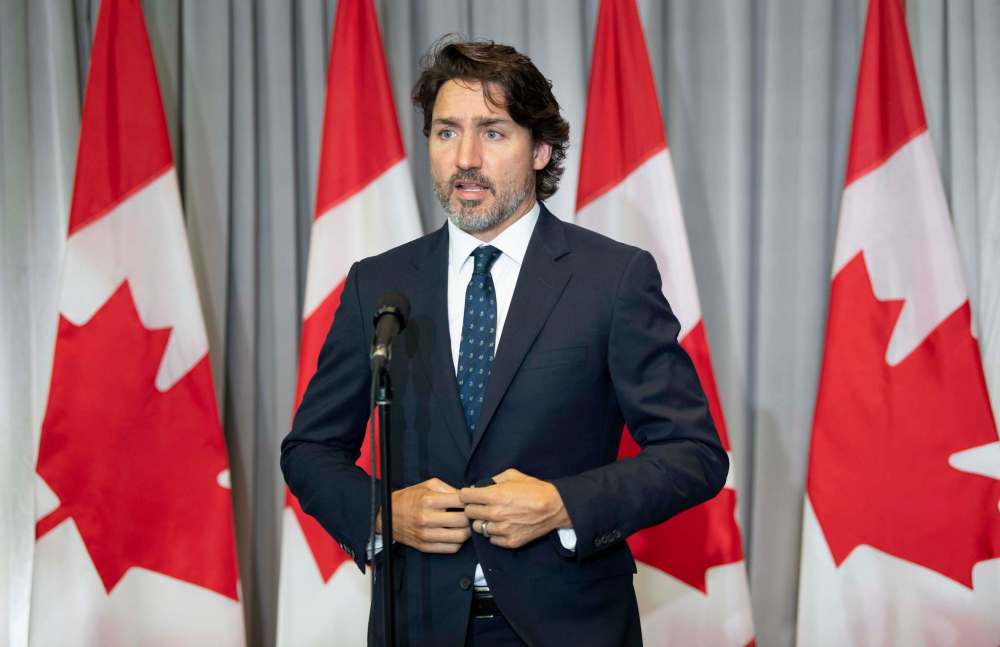Trudeau disappoints with confidence gamble
Advertisement
Read this article for free:
or
Already have an account? Log in here »
To continue reading, please subscribe:
Monthly Digital Subscription
$0 for the first 4 weeks*
- Enjoy unlimited reading on winnipegfreepress.com
- Read the E-Edition, our digital replica newspaper
- Access News Break, our award-winning app
- Play interactive puzzles
*No charge for 4 weeks then price increases to the regular rate of $19.00 plus GST every four weeks. Offer available to new and qualified returning subscribers only. Cancel any time.
Monthly Digital Subscription
$4.75/week*
- Enjoy unlimited reading on winnipegfreepress.com
- Read the E-Edition, our digital replica newspaper
- Access News Break, our award-winning app
- Play interactive puzzles
*Billed as $19 plus GST every four weeks. Cancel any time.
To continue reading, please subscribe:
Add Free Press access to your Brandon Sun subscription for only an additional
$1 for the first 4 weeks*
*Your next subscription payment will increase by $1.00 and you will be charged $16.99 plus GST for four weeks. After four weeks, your payment will increase to $23.99 plus GST every four weeks.
Read unlimited articles for free today:
or
Already have an account? Log in here »
Hey there, time traveller!
This article was published 30/10/2020 (1871 days ago), so information in it may no longer be current.
Majority and minority governments are supposed to be different from one another. Majority governments in Canada are great for the prime minister, because as long as the party caucus is disciplined, the government can pass pretty much whatever legislation it wants. So while majority governments can be decisive and take on unpopular initiatives when necessary, there is little if any need to consult with opposition parties, whose members are reduced to braying across the aisle during Question Period.
In a minority situation, this all changes because the government must convince at least one of the opposition parties to vote with it on any given piece of legislation. In theory, this means minority governments must treat the opposition with greater respect and will be more consultative and moderate in their governing programs. Failure to do so will mean the government may fall after losing the confidence of the House of Commons.
In theory, that’s how things should work. And, historically, they often have. Liberal prime minister Lester Pearson led two minority governments from 1963 to 1968 by relying on NDP votes to survive. The result was enhancements to Canada’s social safety net as the NDP wrung policy concessions out of Pearson. Both medicare and the Canada Pension Plan emerged from this period of minority government.

But things have worked out quite differently in modern times — in part because minority governments have been willing to designate votes in the Commons as confidence motions, with a loss signalling the government has lost the confidence of the House and an election must be called. Under this condition, the logic of consultative minority governments turns on one crucial point: that the opposition parties are willing to follow through with the threat of pulling the plug on the government and, in so doing, causing an election.
Modern minority parliaments can turn into never-ending episodes of brinkmanship, with everyone waiting to see who will blink first. If any opposition party is unwilling to do so, then a minority government can behave like a majority (at least until all the opposition parties muster the courage to defeat the government and go into an election campaign).
Stephen Harper made use of this threat during his time as prime minister in minority parliaments between 2006 and 2011, challenging the opposition parties to “fish or cut bait.” In most cases, the opposition parties were ill-prepared to face the well-funded Conservatives in a snap election. In some cases, opposition MPs intentionally missed parliamentary votes so they would avoid defeating the government.
The opposition parties were scandalized by Harper’s bullying while he led a minority government. But, apparently, Prime Minister Justin Trudeau and the Liberals have changed their mind. Last week, the government designated a Conservative motion to create a parliamentary committee to further investigate the WE scandal a confidence motion. The logic of this, as explained by Liberal House Leader Pablo Rodriguez, was that the motion would “jam and paralyze” the government, and so should be treated as a confidence motion.
But what was Trudeau really thinking? Likely that the Liberal Party is riding high in the polls. Further, we have seen two provincial governments (in New Brunswick and British Columbia) recently re-elected despite plunging their provinces into early election campaigns.
The other federal parties find themselves in different situations. Newly elected Conservative leader Erin O’Toole has only been in the role for a few weeks; Trudeau likely relished the opportunity of taking on a relatively green Conservative leader who is still finding his legs.
But ultimately, it was the NDP that cut bait, refusing to vote against the government on the confidence motion. The federal New Democrats are polling exceptionally poorly and are simply in no position to fight an election campaign.
So Trudeau got his way, but at the cost of significant criticism. CTV journalist Don Martin sputtered that the prime minister’s gamble was “absurd, galling, petty, shameless, throw-the-remote-at-the-TV infuriating.”
Complaining about politicians’ use of such tactics in a minority parliament is like complaining about the weather — winter is coming, no matter how much we dislike it. But perhaps we could make an exception for Trudeau, who rode to power in 2015 in part as a result of public weariness with Harper’s strongman public persona.
Trudeau deserves condemnation for cynically embracing such brinkmanship tactics after condemning Harper’s use of them. Here, as always, Trudeau is hoist with his own self-righteous petard. The prime minister promised a return to sunny ways, but here, as in many other instances, what we got instead was Harper with a beard.
Royce Koop is head of the political studies department at the University of Manitoba.


